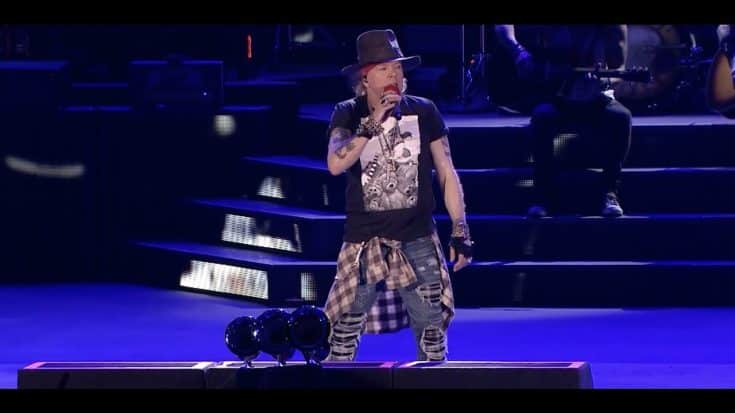There Was A Very Controversial Lyric In GNR’s “Paradise City”

via Guns N' Roses / Youtube
Guns N’ Roses, one of the most iconic rock bands of the late 1980s and early 1990s, has been no stranger to controversies throughout their career. Violence in concerts, feuds with fans and other bands, substance abuse, and even album art troubles. The list is long, but this is how the band embodied the rock and roll spirit of their time.
In their most controversial song, “One in a Million”, frontman Axl Rose can be heard spewing slurs and calling out n*****s and f*****ts. Yes, as terrible as it sounds, the band was quick to defend themselves, with the mixed-race guitarist Slash claiming that fans and critics incorrectly “perceived our personal feelings”.
Personal feeling was also probably what led to Guns N’ Roses singing a different tune for their 1989 hit “Paradise City”. According to the guitarist, the iconic metal song was supposed to have some interesting lyrics.
When they deliberated over the lyrics for “Paradise City”, Slash recalls in a 2012 interview with Fuse that the song’s chorus should’ve been “Take me down to the Paradise City where the girls are fat and they got big titties”.
Slash recalled “I think that was my original lyric for it and the other guys changed it, We all thought it was funny but it wasn’t going to make it on the album. I think that’s how it went.”
“Paradise City”
Thankfully Guns N’ Roses opted for the more politically correct lyrics, “Take me down to the paradise city, Where the grass is green and the girls are pretty”.
“Paradise City” was the third single from the album the seminal GnR debut Appetite For Destruction, following “Welcome To The Jungle” and “Sweet Child O’ Mine.” At that point, Guns N’ Roses had become one of the most talked-about bands in the world, and the song achieved great success, reaching the top ten of the Billboard Hot 100 and charting internationally.
In 1987, Appetite for Destruction initially did not receive that much attention and had, therefore, received little mainstream attention. It was not until the next year that the album exploded into popularity along with the band.
View this post on Instagram
Slash remembered how “Welcome to the Jungle” did not fare well despite it being GnR’s crown jewel from Appetite.
“It was a given that “Welcome to the Jungle” would be the flagship song for the record. If I remember correctly, when it first came out it didn’t get a massive response. It wasn’t until “Sweet Child O’ Mine” that the other videos we did previously became big.”
The three singles became classic hits and propelled the band to superstar status. “Paradise City” also earned accolades for itself, and became one of the best metal songs ever recorded.
Despite the track’s success, Axl Rose did express one regret about the song, but it wasn’t related to the lyrics they had revised.
At the time of its release, he mentioned in an interview with Steve Harris that he wished they had more time for mixing, as they were working against a release deadline, and there were a couple of songs he felt hadn’t been perfected. He believed that “Paradise City” could have been clearer with more time for mixing.
“One In A Million”
Paradise City may have escaped controversy after some needed lyrical change, but it was a different story for “One In A Million”. The racist and homophobic song was released in all its offensive glory in the Appetite for Destruction studio follow-up, the 1988 outing G N’ R Lies.
The final track from the band’s 1988 mini-LP is the most controversial song in their entire repertoire. Penned during Axl Rose’s early days in Los Angeles, the song presents a perplexing, incoherent acoustic ballad characterized by a mishmash of ill-conceived notions and biases. Even the inclusion of whistling and bongos does little to mitigate the song’s harsh and discordant lyrical content.
Here are some memorable lyrics from the song:
Police and n*****s, that’s right / Get outta my way
Don’t need to buy none of your / Gold chains today
Immigrants and f*****s / They make no sense to me/
They come to our country / And think they’ll do as they please
Like start some mini-Iran / Or spread some f**king disease
In a 1989 Rolling Stone interview, Rose defended himself by saying that he used the N-word “because it’s a word to describe somebody that is basically a pain in your life, a problem.”
That doesn’t fix anything, of course, Mr. Rose. And he added, “I don’t like being told what I can and what I can’t say”. The backlash was inevitable and understandable, but the band did little to stave off the criticisms and even defended Axl’s lyrics.
View this post on Instagram
But in 2018, the band sang a different tune. Specifically speaking, they removed the controversial “One in a Million” from their acclaimed boxed set Appetite for Destruction: Locked N’ Loaded.
All songs from G N’ R Lies were included on a bonus disc, except for the controversial song. Slash pointed out that this was a collective decision. While the band did not release anything to reflect this action, it was clear that they wanted to steer clear of the controversy, especially with the rampant cancel culture these days.
It’s worth noting that “One in a Million” hasn’t been hidden away; it remains available on streaming platforms and hasn’t been removed from any official releases. However, it appears evident that the band is in a more introspective phase of their career, one in which their legacy need not be potentially tainted by a controversial song.













